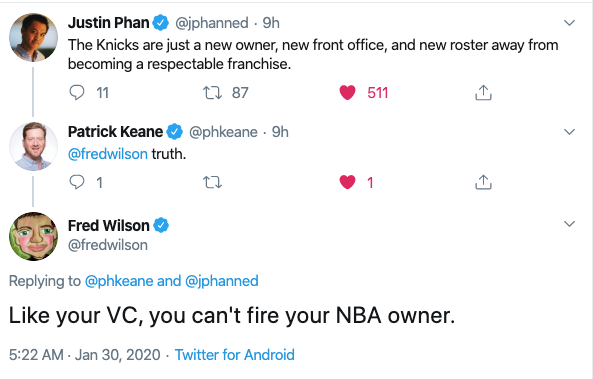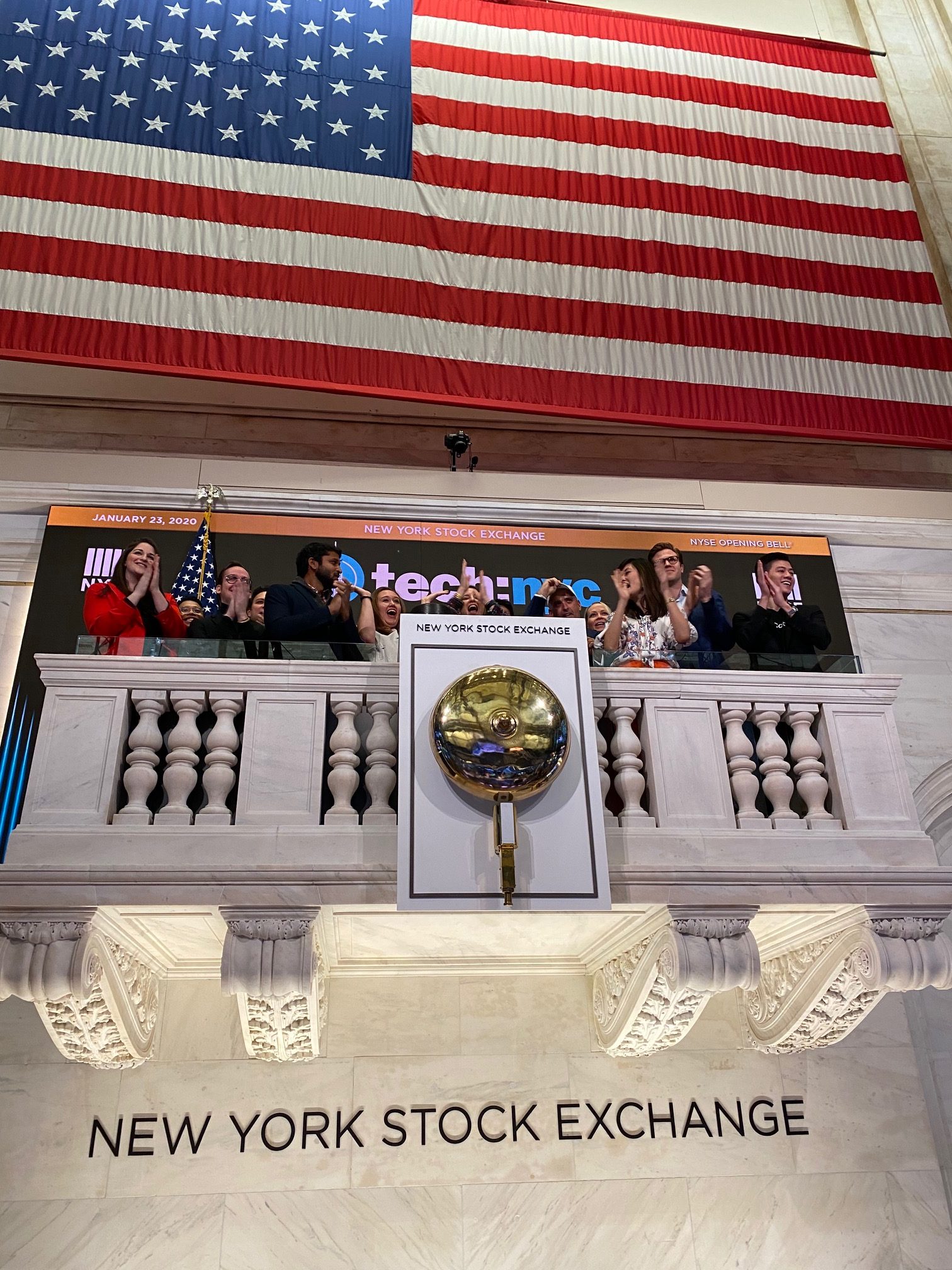Funding Friday: Walsun Fingerprint Bike Lock
I don’t usually take a reward when backing a Kickstarter project, but I really need one of these fingerprint bike locks so I did today when I backed it.
I don’t usually take a reward when backing a Kickstarter project, but I really need one of these fingerprint bike locks so I did today when I backed it.
I saw this tweet coming out of the Upfront Summit yesterday (where I will be today):
It is great that the capital markets serving founders have become hyperefficient. Being able to get a round done in a week vs a quarter is huge for founders who have better things to do than run around the country talking to VCs.
However, there is a dark side to this trend and that is the reality that shotgun marriages don’t often work out so well. You might be able to get a VC into your cap table in a week but try getting them out. That’s almost impossible.
Which reminds me of this tweet exchange with some friends about the Knicks ownership situation:

Since launching AVC 3.0 on January 9th, we have had some site reliability issues.
The most common issue is a “too many redirects” error that has been reported by many people and is intermittent and not easily reproducible. That said, a number of you have been able to create .HAR files and send them to me. Thank you for doing that. Siteground and Cloudflare are now debugging this issue and we hope to have it resolved soon.
I have found that clearing your cache in your browser can help with this issue, but even so, I want to resolve it properly and hope to be able to do so soon.
Last week we had a DDOS attack from China that was caught by Cloudflare and mitigated, but it did result in a short amount of downtime and required blocking several IP addresses at Siteground.
And finally, Siteground had some unplanned downtime this past week as well.
This is not a great way to start out of the gate with a new version of AVC and I am sorry about it.
Those of you who get AVC via email and RSS should not have noticed anything as those services were not impacted to my knowledge.
I just posted about USV’s investment in Justworks on the USV blog.
I have known Isaac Oates for over a decade and he’s a terrific entrepreneur and has built a great company which offers a fantastic HR solution to small and mid sized companies.
If you don’t love the payroll and benefits solution your company uses, go here and find out how Justworks can change that for you and your employees.
It was nice to see Billie Eilish and her brother Finneas O’Connell run the table on the Grammy’s last night. It was yet another sign that the age of self made artists is upon us.
As is our custom, my partner Andy and our friend Whitney posted some music to Twitter today. Andy and I went with Billie Eilish.
it's fun to go back and listen to her early stuff on SoundCloud. https://t.co/auxqxaO2sd so nice to see her and her brother get the props they deserve.
— Fred Wilson (@fredwilson) January 27, 2020
Which led to this response by Arnold:
i like to believe that great art and great artists have the tools today to bypass that top driven industry and be heard on their own terms.
— Fred Wilson (@fredwilson) January 27, 2020
The music industry remains vital and is enjoying a financial renaissance as streaming platforms provide a massive earnings stream for the industry.
But underneath all of that is the fact that great art and great artists now have a much easier time finding their audience and being discovered. And that’s a great thing, just like Billie’s music .
What a wonderful project. I backed it today.
Tech:NYC is NYC’s tech industry advocacy group. According to its 2019 Annual Report, Tech:NYC has over 800 member companies representing all shapes and sizes of tech companies in NYC. I am the co-chair of Tech:NYC.
Today, the NYSE decided to celebrate tech startups in NYC (some of whom will eventually make their way to the NYSE) by inviting the leaders of Tech:NYC and some member companies to ring the opening bell.
This tweet has a short video that shows the scene as it unfolded:
NYSE Opening Bell 🔔: @TechNYC celebrates tech startups in NYC https://t.co/CBrUHdTsaJ
— NYSE 🏛 (@NYSE) January 23, 2020
Here is a photo if you can’t see the tweet:

If you are a tech company in NYC and want to be part of Tech:NYC, please go here and learn about the member companies, what it takes to become a member, and join.
Our portfolio company Stack Overflow (which I like to call Stack) is an Internet Treasure. My friend Mark Pincus introduced me to the concept of an Internet Treasure many years ago and I am a fan of the notion.
In my view, an Internet Treasure is a service on the Internet that is wide open, gets better when more people use it, and solves a need that many/all of us have. Wikipedia is an Internet Treasure. Quizlet is an Internet Treasure. Reddit is an Internet Treasure. And Stack is an Internet Treasure. There are many more out there but you get the idea.
Stack has a new leader and his name is Prashanth Chandrasekar. Prashanth wrote a “State of the Company” post yesterday on the Stack blog and I would like to highlight a few sections from it.
First, this is what an Internet Treasure looks like by the numbers:
Across Stack Overflow and the Stack Exchange network, we saw around 10 billion page views from 100+ million unique visitors over the course of 2019.
In 2019, Stack Overflow added over 2.8 million answers and 2.6 million new questions, with over 1.7 million new users joining the community. There are now over 18 million questions and 27 million answers on Stack Overflow, and over 150,000 people sign up for a Stack Overflow account each month, 12 years after we started.
Every day, users answer thousands of questions on topics like cloud technology, container orchestration, and machine learning. There is an ever growing trove of knowledge on Amazon Web Services, Google Cloud Platform, and Microsoft Azure.
Our community members and volunteer moderators handled almost two million flags to keep inaccurate, abusive, unwelcoming, or inappropriate content off the site and in line with our updated Code of Conduct.
Hundreds of thousands of engineers leveraged the power of Stack Overflow for Teams to better collaborate and ship products faster.
Over 40,000 jobs were posted on Stack Overflow Jobs in 2019. We now have over 1,000,000 searchable profiles of developers who are interested in being contacted about a job on Stack Overflow Talent.
Almost a million developers found new and useful tools after seeing a company advertise on one of our sites.
New leaders don’t want to sit still. They arrive, take measure of the people and the business, and then make big plans.
And this is how Prashanth is thinking about the future of Stack:
1/ Continue to invest in the community, insure that the Code Of Conduct evolves to mantain the trust and safety of the community, and broaden the number of developers who fully engage in a the community.
2/ Continue improve and invest in Stack Overflow For Teams which allows organizations to use the same tool for internal knowledge sharing as they use for external knowledge sharing
3/ Expand the Advertising and Talent offerings to offer developers easy access to new tools and new career opportunities.
4/ Build and expand the team so that the Company can be responsive to the needs of developers and move quickly to adapt as the developer ecosystem changes.
5/ Stay true to the mission of supporting the needs of developers and technical workers and help them succeed in their jobs and develop their careers.
I am excited to see Stack flourish under Prashanth’s new leadership. That’s what we should want for all of our Internet Treasures.
A friend asked me over the weekend “why do VCs ask for a management rights letter when they make an investment?”
A management rights letter is a short agreement between a company and an investor to allow them certain “management rights.” These are typically the ability to attend board meetings, the ability to have access to financial reports on a regular basis, and the ability to advise and consult with the management of the company.
While it is nice to have these “rights”, the need for this letter actually has very little to do with how venture capital firms want to work with a portfolio company.
The existence of these letters has everything to do with where the venture capital firms get their funds from. If a VC firm has pension fund investors who are subject to ERISA regulations (as USV does), then they need to be a “venture capital operating company (VCOC)”. And one of the best ways to make sure you are considered a VCOC is to have management rights letters for all (or most) of your investments.
This post on Startup Lawyer explains it well:
Venture funds request these rights in order to obtain an exemption from regulations under the Employee Retirement Income Security Act of 1974. Absent an exemption, if a pension plan subject to ERISA is a limited partner in a venture fund, then all of the venture fund’s assets are subject to regulations that require the venture fund assets to be held in trust, prohibit certain transactions and place fiduciary duties on fund managers. However, a “venture capital operating company” is not deemed to hold ERISA plan assets. To qualify as a VCOC, a venture fund must have at least 50% of its assets invested in venture capital investments. In order to qualify as a venture capital investment, the venture fund must receive certain management rights that give the fund the right to participate substantially in, or substantially influence the conduct of, the management of the portfolio company. In addition to obtaining management rights, the fund is also required to actually exercise its management rights with respect to one or more of its portfolio companies every year.
http://www.startupcompanylawyer.com/2007/12/03/what-is-a-management-rights-letter/
So as annoying as these letters are, it really doesn’t make a lot of sense to try to negotiate away these agreements as the venture capital firm that is asking for it really does need these rights in order to be in business with their limited partners.
I read this post on Bloomberg about a theme this week at Davos (never been) about the 2020s being a “Peak Decade”:
Even if some (most?) of these predictions are wrong, the very fact that leaders at the highest levels of business and government are having this conversation is encouraging.
We are leaving the industrial age behind and moving into the knowledge age and we need to leave some things behind as we make that transition. My partner Albert’s book is a good read if you want to dig deeper on this topic.